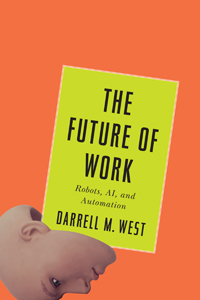The Future of Work: Robots, AI, and Automation by Darrell M. West, Washington, D.C.: Brookings Institution Press, 2018, 205 pages.
Retail cashiers make up roughly 2.2 percent of the U.S. labor force. But technologists predict they will eventually be replaced by microchips that debit the accounts of shoppers as they exit stores.
The technology to replace harder-to-automate jobs — paralegals, radiologists, even jazz musicians — is starting to emerge. The prospects for employment in general are bleak, argues Darrell West, director of governance studies at the Brookings Institution, in The Future of Work: Robots, AI, and Automation. "Unless we get serious about impending economic transformations, we may end up in a dire situation of widespread inequality, social conflict, political unrest, and a repressive government to deal with the resulting chaos."
West details advances that have the potential to change virtually any personal or professional task through robotics, artificial intelligence, and the "Internet of things" (generally defined as fixed and mobile devices connected to the Internet). Most of this is thus far conceptual, so the ultimate labor impacts are murky. Estimates of the share of existing jobs that will be automated in the next three decades range from around a tenth to one-half. Some experts predict a high chance that robots will eventually outperform humans at all tasks, from surgery to writing best-selling novels.
Such trends clearly command some rethinking about the role of work in our economy and society. At the same time, displacement of workers can't be the end of the story. Mentioned but unexplored by West is what robots and AI will free up humans to do. Who anticipates robots' needs, determines how they'll be used, and manages them? Who translates their output into actionable business decisions, firm-level strategies, and the next big innovations?
Without wading into complacency, it is worth noting that history is on the side of labor. The literature on immigration, for example, has found that in many cases, native wages rise. And historically, job loss to innovation has been met with wage growth and new jobs in previously unimagined areas. Many of the nation's 7.4 million tech occupation jobs did not exist 30 years ago (and they tend to pay wages far higher than the national average). In the end, economic theory suggests things depend on the extent to which technology becomes cheaper than labor in the long run.
For labor to win in that equation, workers will need greater skills. West advocates a new culture of lifelong learning, a challenging task since retraining programs and apprenticeships have struggled to provide skills that stay relevant over time. A promising avenue may be investment in soft skills, which are inherently more transferable across tasks. West cites Massachusetts Institute of Technology economist Andrew McAfee's argument that the educational system needs to produce graduates who can negotiate, motivate, provide compassionate service and great experiences, and intuit the next business problem several steps in advance. One avenue that West doesn't mention is investments in early childhood education; there is evidence that students who lack soft skills early on only fall further behind in that dimension.
While not explicitly endorsing all of them, West offers a range of possible ways to buffer the costs to workers. He would like to see the nation consider health, retirement, and other benefits tied to "citizen accounts" that are portable across jobs and that could be credited for socially beneficial activities such as volunteer work (as is done in the United Kingdom). He also cites paid family leave; revamping the earned income tax credit to help the working poor; expanding trade adjustment assistance to include technology disruptions; providing a universal basic income; and deregulation of licensing requirements so that it is easier for workers to change industries. West advocates a "solidarity tax" on high net worth individuals to pay for much of this.
Most of these prescriptions are not specific to technology, and many are things society may want to consider anyway. But West makes a familiar and compelling case that the political system may be slow to act. Whereas society responded to disruptions resulting from the industrial revolution — with reforms ranging from worker safety to the creation of primary elections to break up political power — today the combination of political polarization and economic inequality may make consensus and then productive change more difficult. West believes recent populist movements spurred in part by economic disenfranchisement are only the beginning. He advocates reforms to make the political system more representative, and these, too, are worth consideration regardless of the scale of automation to the extent that they make politics more fair.
Though one wonders if labor will become quite as irrelevant as West imagines, his is a comprehensive, though rather high-level, review of the coming challenges and proposed remedies. It is hard to imagine that most people won't be left far better off due to technological progress. But West makes a compelling case that the extent to which they are depends on how public and private decisions alike prepare us.




